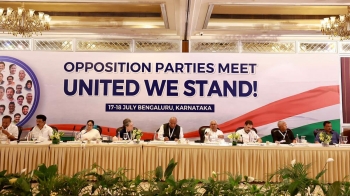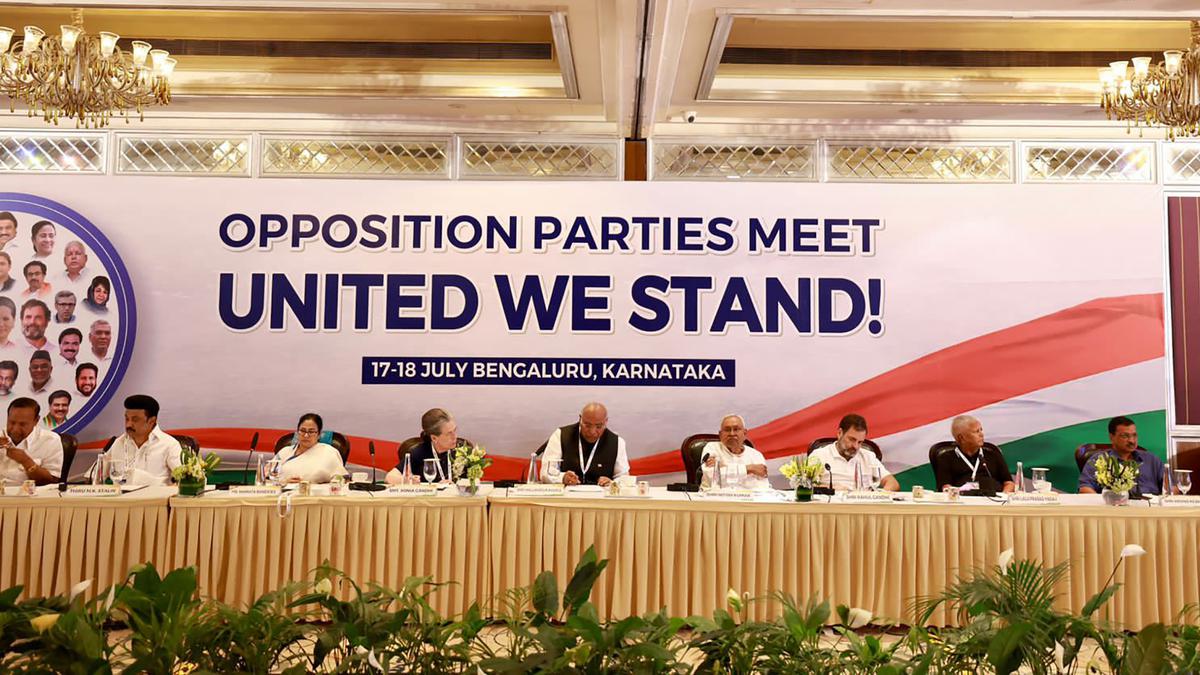
.png) Jacob Peenikaparambil
Jacob Peenikaparambil

When democracy, Constitution and diversity are under relentless attack by the ruling BJP, it is heartening to note that the opposition parties have agreed on protecting them as the objective of their coming together. While agreeing on a common name for the group of 26 opposition parties as Indian National Developmental Inclusive Alliance (I- N- D-I- A), the objective of the Alliance, according to Congress President Mallikarjun Kharge, is to “safeguard democracy, constitution and diversity”. These parties have agreed to evolve a Common Minimum Programme to achieve these objectives and an "alternative political, social and economic narrative".
If the opposition parties come together only to defeat the BJP, they will not be able to win the confidence of the people. On the contrary, they have to present an ideological narrative in consonance with the core Indian constitutional values and an agenda to solve the burning problems of people -- soaring unemployment, price rise, increasing crimes against women, Dalits and Adivasis, etc. Even though the opposition parties have their own ideological underpinnings, they can agree on the core constitutional principles like secular democracy, fundamental/human rights of citizens, independence of the judiciary, the federal structure etc.
The BJP-RSS combine will try all tricks to focus on emotional and divisive issues to win the election, as they do not have much to showcase as their achievements. The opposition parties should not deviate from focussing on the real issues. They should follow the strategy that Congress adopted in the Assembly elections in Karnataka. The BJP tried to rake up communal issues and its leaders asked people to vote in the name of religion. But the Congress by and large stuck to the issues like corruption, unemployment and price rise.
The issue of UCC (Uniform Civil Code) has been raked up by the Prime Minister as an election issue, presuming that the opposition parties will oppose it in order to attract the minority votes. But the Congress has adopted a wise approach of wait and see. The party has said, “Let the government bring the Bill and then we will respond to it”. Many political observers are of the view that the BJP may not bring the Bill before the Lok Sabha election. The party has raised the issue before the Lok Sabha election and a slew of Assembly elections to polarize the Hindu votes in favour of it.
Winning elections by appealing to the religious sentiments of the majority community and toppling state governments led by the opposition parties to capture power have been the main focus of the BJP during the last nine years. In this process, governance took a backseat. When violence erupted in Manipur and the state was burning, the priority of the Union Home Minister and the Prime Minister was electioneering in Karnataka. For the BJP democracy means winning elections, capturing power and remaining in power.
Getting the mandate of the people through elections is only one aspect of democracy. Making the government accountable to the people through forums like Parliament and Assemblies and an impartial and critical media are equally important. The BJP governments often do not allow the opposition to raise vital issues for discussion in Parliament and Assemblies. Crucial Bills like CAA, the abrogation of Article 370 and the bifurcation of Jammu and Kashmir state into two Union Territories and the three farm Bills were passed without sufficient discussion and without referring them to the parliamentary committees for detailed studies. Thus, Parliament has been reduced to a rubber stamp under the Modi regime. Parliament and Assemblies have to function as forums where the issues affecting people and proposed legislations are thoroughly discussed and the pros and cons are made known to people.
In a number of states where the BJP could not win elections, it adopted a strategy of breaking the ruling parties by encouraging and abetting defections. Two examples are Madhya Pradesh and Maharashtra. The investigation agencies like Enforcement Directorate and CBI are used in this game of defection or breaking of parties. When raids are conducted and cases are filed against corrupt MLAs and MPs, they are forced either to join the BJP or a faction of their own party that supports the BJP, as happened in Maharashtra recently.
Three Nationalist Congress Party (NCP) leaders, who were sown in as Cabinet Ministers in Maharashtra’s Eknath Shinde-Devendra Fadnavis government on 16th July or their family members, are facing probe by the Enforcement Directorate or Anti-corruption Bureau. Once these leaders switch their allegiance to the BJP, the corruption cases against them are put in cold storage so much so the opposition parties have nicknamed the process as ‘washing machine’ or ‘laundering’. The strategy of using the probe agencies to engineer defections in the opposition parties is anti-democratic.
In the absence of a strong opposition, democracy will become autocracy. The BJP wants an electoral autocracy. That is why during the electioneering in 2014, BJP’s Prime Ministerial candidate Narendra Modi spoke voluminously on a “Congress-Mukt Bharat”. As Congress is the only pan-Indian political party other than the BJP, “Congress-Mukt Bharat” means a democracy in which there is no effective opposition.
The BJP has been using all the tricks to weaken the Congress for the last nine years. But the Bharat Jodo Yatra led by Rahul Gandhi and the impressive victory of the Congress in Karnataka along with the coming together of 26 opposition parties on a common platform have rattled the BJP and the Prime Minister. That is why frantic efforts are being made by the BJP to increase the number of parties in the NDA by cobbling together a few minor political outfits. The opposition parties in their common agenda have to include provisions for strengthening democratic institutions by allowing them to function as per the Constitution of India.
The opposition parties have to declare in unequivocal terms their commitment to secularism/pluralism, a key feature of the Indian Constitution and a heritage of India for millennia. One of the reasons for the rout of the Congress in the previous elections is its compromise with Hindutva ideology by adopting soft Hindutva. Soft Hindutva will not be able to defeat hard Hindutva of the BJP.
The manifestos of the opposition parties have to include provisions for reviewing the draconian anti-conversion laws and Love Jihad laws passed by the BJP government mainly to harass and persecute the minority Muslims and Christians. The practice of the government spending huge amounts of money for building or renovating worship centres and erecting huge statues of religious figures should be stopped.
Taxpayers’ money should not be used for the promotion of any particular religion. In a secular country, the government should keep away from religious activities of any religion while allowing the citizens to “profess, practice and propagate” the religion of their choice, as provided in Article 25 of the Indian Constitution.
Closely related to the issue of restoring secularism is to stop spreading hatred, especially through social media platforms, against minorities and other underprivileged groups like women, Tribals and Dalits. Individuals and organizations that are specializing in manufacturing and marketing hatred are to be dealt with sternly so that sanity will prevail in Indian society.
Similarly, the unconstitutional Citizenship Amendment Act (CAA) is to be shelved. An assurance to this effect is to be included in the manifesto or Common Minimum Programme of the opposition parties. Lynching should be banned by putting in place a new law and the cow protection laws are to be reviewed to prevent their abuse by the cow vigilantes.
Another area the opposition parties have to assure the people of India is stopping the misuse of draconian laws like UAPA, NSA, Sedition Law etc. For this purpose, the needed amendments are to be brought in these laws. The British era sedition law has to go from the law book. Journalists, social activists, academics, who are put in jail, being accused under UAPA and other draconian laws, are to be released on bail at the earliest. The persons responsible for falsely implicating these people and allowing them to be incarcerated are to be punished as per the law.
Another important assurance expected from the opposition parties is allowing the institutions and investigating agencies to function without any pressure or interference by the executive. First of all, the government should allow the judiciary to function with the independence granted to it by the Constitution. Secondly, the investigating agencies like CBI, ED, NIA etc. are to be liberated from the clutches of the government. The officers of these agencies are mainly accountable to the people and not to their political bosses, as they are paid by the taxpayers’ money. They are to be made accountable for the wrong decisions they take and misusing their authority.
An assurance not to impose Hindi as the only link language throughout India is to be included in the Common Minimum Programme, as India has many languages and a huge number of people are not conversant with Hindi. At the same time, promotion of Hindi in an environment of freedom is to be welcomed and appreciated.
Academic freedom is to be granted to the academic institutions and universities without undue interference by the government. The distortions that have taken place in rewriting history and in the preparation of textbooks are to be corrected. The New Education Policy (NEP) also needs the required changes. Attempts to impose a particular ideology through educational policies are to be stopped.
Some political observers are of the view that if the BJP comes to power in 2024, the future of Indian democracy will be in peril. If the opposition parties do not give up their petty interests and agendas and adopt a policy of give and take, their own existence will be in question, besides allowing India to slip into fascism. The nine years of the BJP rule has resulted in a grave erosion of the Indian Constitutional values and principles because the ideology of Hindutva is diametrically opposed to secular democracy, inclusiveness, equality and diversity, as it insists on one religion, one language and one culture.